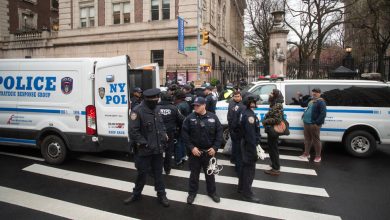Arnie Kantrowitz, Pioneer of Gay Liberation, Dies at 81

Arnie Kantrowitz, a literature professor and author who was an early champion of gay rights and an indefatigable campaigner for fairer treatment of gay people by the media, died on Jan. 21 at a rehabilitation center in Manhattan. He was 81.
The cause was complications of Covid-19, his life partner, Dr. Lawrence D. Mass, said.
The gay rights movement was ignited in mid-1969 by the uprising provoked by a police raid on the Stonewall Inn in Greenwich Village, which led to the founding several months later of the Gay Activists Alliance. Mr. Kantrowitz became the organization’s vice president in 1970, which was also the year he came to grips with his own homosexuality.
In 1985, he was a founding member of the Gay and Lesbian Alliance Against Defamation (now known as GLAAD), which was established to counter negative media coverage generated by the AIDS crisis.
His memoir, “Under the Rainbow: Growing Up Gay” (1977), exposed to a wide audience the difficulties he and his gay contemporaries faced in the 1950s and ’60s and recalled how he had confronted them — including two suicide attempts. The book also chronicled historical events in the movement, including what was called the first Christopher Street Gay Liberation Day Parade, held in New York City in 1969.
“He was a leader of the generation of activists in the immediate aftermath of the Stonewall Rebellion who put their lives and livelihoods on the line to advance the cause of gay liberation,” Andy Humm wrote last month on GayCityNews.com.
Dr. Mass called Mr. Kantrowitz “a true sage and champion.”
Arnold Kantrowitz was born on Nov. 26, 1940, in Newark. His mother, Jean (Zabarsky) Kantrowitz, was a real estate broker. His father, Morris, was a lawyer and a salesman.
Arnold graduated from Weequahic High School and was accepted by Columbia and Princeton. But recalled later that, being both gay and Jewish, he didn’t enroll in either school because he lacked self-confidence.
“I felt ‘other,’” he said in an interview with the Queer Newark Oral History Project in 2015. “I felt different from what my parents wanted me to be.”
“My mother even took me to a doctor,” he added. “He didn’t think I was gay, he thought that I was sensitive. And I was! Both!”
He graduated from Rutgers University-Newark with a bachelor’s degree in 1961 and earned a master’s in 1963 from New York University, both in English literature. He also completed his preparation for a doctoral degree at N.Y.U.
His first teaching job was at the State University of New York at Cortland, from 1963 to 1965. He taught from 1965 until he retired in 2006 at the City University’s College of Staten Island, where he introduced one of the earliest gay studies courses. He was named chairman of the English department in 1999.
Mr. Kantrowitz was a leading proponent of the work of Walt Whitman and the author of a biography of Whitman that was published in 2005 as part of the series “Gay and Lesbian Writers.”
At one point, he shared a home at 186 Spring Street in Lower Manhattan with two other gay rights leaders: James W. Owles, who died of AIDS in 1993 at 46, and Dr. Bruce Voeller, who died of AIDS in 1994 at 59.
Along with Dr. Mass, a physician and writer who was a founder of the Gay Men’s Health Crisis, Mr. Kantrowitz is survived by his brother, Barry.
Having been present at the creation of the gay rights movement, and having outlived so many of its other founders, many of whom died of AIDS, Mr. Kantrowitz provided a longer perspective on the movement’s progress, and on the personal balance of patience and will power needed to endure being gay in an unwelcoming world.
He recalled in his Queer Newark interview that during his earliest days in the Gay Activists Alliance, he assumed that same-sex marriage would be embraced by Americans immediately. A few years later he realized it would take much longer,
“And now that I look back it took an instant, you know,” he said, “because looking at the long historical view, how many years is it? Forty-six, 50 years, whatever? That’s a tiny amount of time given the span of history.”
Similarly, he remembered that when he was teaching, gay students would share questions with him about their sexuality, cautiously, but with a candor he had never felt comfortable with when h was a college student.
“Students came to me with their secrets and, you know, I was as supportive as I could be,” Mr. Kantrowitz said, “and encouraging them, saying, ‘I survived and you will, too.’”



